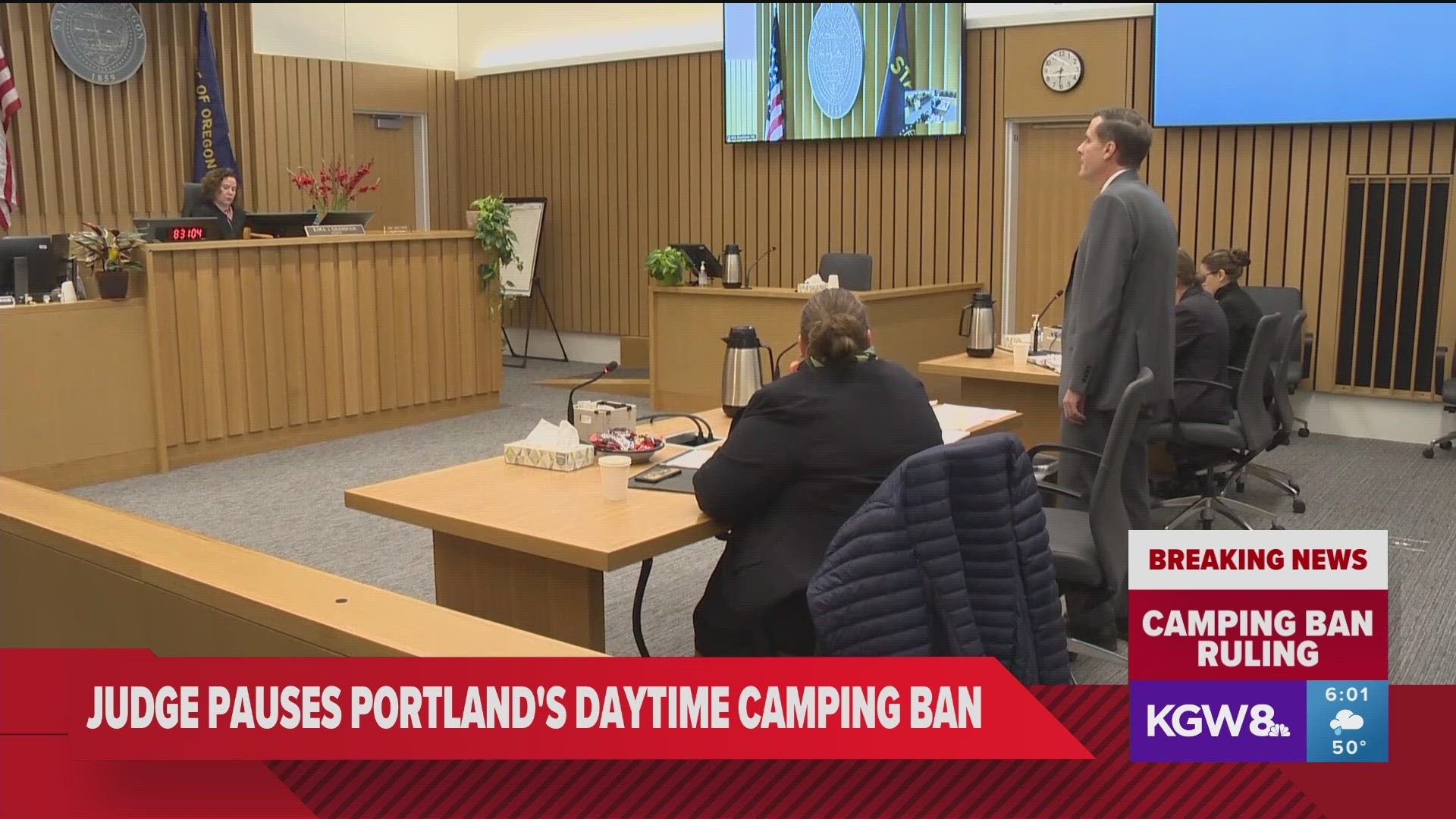PORTLAND, Ore. — On Thursday, a judge placed a temporary hold against the enforcement of Portland's daytime ban on homeless camps that was slated to start next week.
Homeless Portlanders, represented by the Oregon Law Center, filed a class action lawsuit against the city at the end of September, arguing that Portland's camping ordinance violates state law and the Oregon Constitution. Attorneys filed last week for a preliminary injunction, asking a Multnomah County judge to block the ban while the court case unfolds.
In a hearing on Thursday morning, both sides made their arguments before Judge Rima Ghandour. Attorneys for homeless Portland residents said enforcement of the ordinance would harm the most vulnerable. They also said the camping ban is vague and difficult to understand.
Attorneys for Portland said the city had a right to decide what public land can be used for camping, and what cannot.
Judge Ghandour ruled against the city, blocking the enforcement of the ban from starting on Monday. The judge stated that "...the Court finds that Plantiffs made a sufficient showing to warrant preservation of the status quo so that, upon a final hearing, full relief may be granted."
Mayor Ted Wheeler issued a statement regarding Thursday's ruling, "I believe the status quo is not working, but the Court’s decision leaves the status quo in place. The City will abide by the Court’s preliminary order while continuing to fight in court for the City’s right to adopt reasonable regulations on unsanctioned camping," he said. "The Court’s decision today makes the City’s work harder, but the City is going to continue this fight and we hope to get a better understanding of the Court’s reasoning during this litigation."
Portland City Council adopted the new ordinance back in June, and it went into effect in early July. But city officials pledged to wait until the fall before enforcing the camping ban, saying they'd spend the intervening months on "education and outreach" so that homeless Portlanders and service providers alike would be prepared for the shift.
Mayor Ted Wheeler announced last week that enforcement would begin Nov. 13, at least on a limited scale. City officials admit that they don't have the resources to enforce the camping ban universally and will focus on camps that provoke the most complaints.
Under the ordinance, camping on city property is prohibited between the hours of 8 a.m. and 8 p.m., and round the clock around sites like schools and childcare centers, parks, major streets and shelters. Violations result in two warnings before potentially incurring jail time or a $100 fine, enforceable by Portland police officers.
Both Wheeler and Multnomah County District Attorney Mike Schmidt have indicated that they prefer to avoid jail sentences for violators in favor of other interventions, although it isn't precisely clear what that will look like.
The legal landscape
Major court rulings in the Western U.S. and subsequent changes to Oregon law dictate the way that camping bans can or cannot be enforced. Unless a given city has sufficient shelter space to house someone camping outside, enforcement of a camping ordinance enters legally fraught territory.
In 2018, the Ninth Circuit Court of Appeals ruled in Martin v. City of Boise that a city cannot charge someone with a crime or give them a ticket for sleeping in a public space if there's a lack of shelter beds. A three-judge panel found that charging someone with a crime for sleeping outside when they have no other option is a violation of the Eighth Amendment, qualifying as cruel and unusual punishment.
Not long after the Boise ruling, the southern Oregon city of Grants Pass found itself subject to another class action lawsuit — as in the newer Portland case, one brought by homeless residents represented by the Oregon Law Center. The city attempted to argue that its civil penalties for camping did not violate any constitutional rights, despite a shortage of shelter space. A Ninth Circuit panel ruled against the city, expanding on the logic it employed in the Boise case.
Grants Pass has appealed its case to the U.S. Supreme Court, but it's too soon to know whether the high court will take it up.
While both of these cases were federal ones, their outcomes have shaped Oregon law. In 2021, the legislature passed House Bill 3115, which mandated that Oregon cities update their camping ordinances by July of this year, adopting "objectively reasonable" time, place and manner restrictions instead of maintaining blanket bans.
HB 3115 essentially worked to codify the Boise and Grants Pass cases into Oregon law, requiring that cities either ensure they have sufficient shelter space or adopt ordinances that provide carveouts for people to sleep on public property, at least to a certain extent.
Portland's new camping ordinance was ostensibly drafted to align with HB 3115, likely explaining why it's a daytime ban and not a full-time one. But the Oregon Law Center, in its lawsuit, argues that the ordinance is "objectively unreasonable, cruel and incomprehensible" — violating the law that HB 3115 established and the Oregon Constitution's own section on cruel and unusual punishment.
"The Ordinance subjects the approximately 10,000 Portlanders living outside every night to 30 days in jail for violating a law that is impossible to understand or comply with," the complaint argues.
In an affirmative defense filing, the city of Portland acknowledged and agreed with some of the lawsuit's claims — that there is an affordable housing crisis and that homeless Portlanders face daily challenges — but denied that the camping ordinance represents the criminalization of homeless people, that it is impossible to understand or comply with, or that the penalties for violations are grossly disproportionate to the offense.
Regardless of the outcome of Thursday's hearing on the Oregon Law Center's request for a preliminary injunction, the case will likely continue to play out in court, though the timeline is uncertain. No trial date has yet been set in the case.

